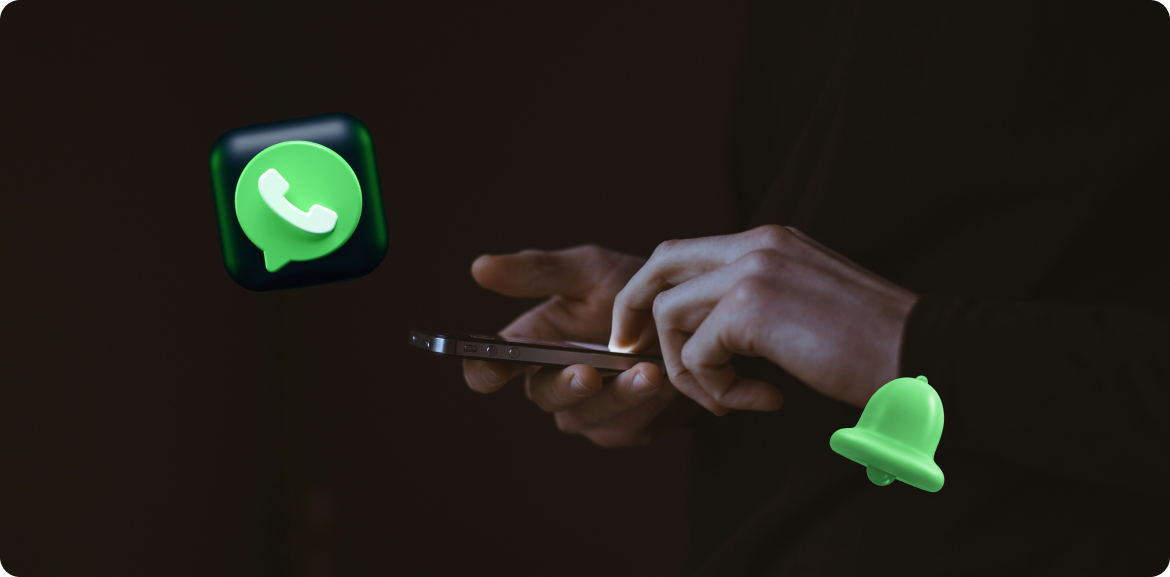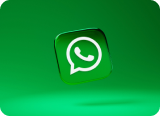Why WhatsApp Should Be Your Go-To Channel for Sharing Custom Notifications

With the business environment becoming more challenging with competing brands offering very similar products and services, CX has quickly become a key differentiator for those wanting to stand out. Providing a highly personalized customer service has become non-negotiable for such businesses as they vie increasingly elusive customer loyalty. WhatsApp, with its phenomenal popularity and many innovative uses – from marketing to customer support – has become the go-to channel for businesses looking to cut through the noise and reach their customers in a direct, personal way. It has many features that help businesses send highly personalized notifications on the app. In this blog, we will explore the benefits of sharing custom notifications on WhatsApp, the top features that enable this personalization, and a guide on how to send them.
Benefits of Sharing Custom Notifications on WhatsApp
Personalized Communication
Custom notifications on WhatsApp allow businesses to tailor messages specifically to their customers’ needs, preferences, and behaviours. By leveraging data such as purchase history, browsing behaviour, and customer feedback, businesses can create highly personalized messages. This level of personalization makes customers feel valued and understood, leading to a more positive and engaging customer experience. For example, a retail store can send personalized recommendations based on a customer’s previous purchases, or a healthcare provider can send appointment reminders with specific instructions for each patient. This tailored approach adds more value for customers, who are more likely to respond to such messages.
Higher Engagement Rates
One of the top advantages of personalized communication is the higher engagement rates it generates. Customers are more likely to open and respond to messages that are relevant and personalized. Generic notifications often get ignored or deleted, but a well-crafted custom notification can capture the customer’s attention and prompt immediate action. For instance, a special offer tailored to a customer’s buying habits is more likely to be redeemed than a generic discount. Similarly, personalized follow-up messages after a purchase can encourage repeat business and foster customer loyalty.
Timely Updates
Custom notifications ensure that people receive timely updates about their orders, appointments, or any other important information. This immediacy is particularly beneficial in today’s fast-paced world where customers expect quick and efficient communication from businesses. For example, e-commerce companies can use WhatsApp notifications to inform customers about their order status, from confirmation and shipping to delivery. Healthcare providers can send timely reminders for upcoming appointments or follow-up care instructions. This not only keeps customers informed but also helps in reducing no-shows and cancellations.
Cost-Effective
WhatsApp notifications are a cost-effective way to reach a large audience. Traditional communication channels like SMS or direct mail can be expensive, especially when reaching a vast customer base. WhatsApp, on the other hand, offers a low-cost alternative that can deliver messages instantly to customers worldwide. By using WhatsApp Business API, businesses can automate and scale their communication efforts without incurring significant costs. This makes it an ideal solution for small and medium-sized enterprises looking to manage communications while optimizing their marketing budgets.
Enhanced Customer Satisfaction
Providing relevant and timely information through custom notifications can significantly enhance customer satisfaction. When customers receive messages that are pertinent to their needs and delivered at the right time, they are more likely to view the business favourably. For example, a timely notification about a service disruption and the steps being taken to resolve it can prevent customer frustration and demonstrate the business’s commitment to transparency and customer care. Similarly, personalized thank-you messages or feedback requests after a purchase can make customers feel appreciated and valued.
Top WhatsApp Features That Help Businesses Share Customized Messages
Over the years, Meta has continuously enhanced its WhatsApp Business API product by adding greater functionality to make it the perfect tool for highly customized business messaging that creates an engaging and tailored experience for customers. Here are some of its top features:
Message Templates
Businesses can create and use pre-approved message templates for various scenarios such as order updates, appointment reminders, and promotional messages. These templates can include placeholders for dynamic content, allowing for personalization based on customer data. The templates can incorporate dynamic fields (e.g., customer’s name, order number, appointment time) to customize each message.
Customer Segmentation
The API allows businesses to segment their customer base based on purchase history, behavior, demographics, or other relevant criteria and then target them with relevant messaging. By recognizing the distinct characteristics and needs of each customer segment, businesses can craft more targeted and effective marketing campaigns. They can run personalized marketing campaigns by sending tailored offers, discounts, or information to specific customer segments. This approach leads to higher engagement, enhanced customer satisfaction, and ultimately, increased conversion rates. Moreover, segmentation allows marketers to send messages at optimal times, ensuring their content reaches the right audience when they are most receptive.
Interactive Messages
Messages that are interactive create significantly more engagement than those that are not. WhatsApp has interactive features like Quick Replies and buttons that encourage customers to take the next steps easily. The Quick Reply feature allows businesses to provide customers with predefined response options, making interactions more interactive and personalized. Also, adding buttons like “Book Now,” “View Order,” or “Contact Support” to messages help customers take the desired action. These interactive elements reduce friction in communication, allowing users to quickly access information, complete purchases, or book appointments directly within the chat. By enhancing the immediacy and convenience of the customer experience, interactive messages keep users engaged, encourage real-time interaction, and drive higher conversion rates. Additionally, they enable businesses to gather valuable insights through user interactions, further refining their marketing strategies and improving overall customer satisfaction.
Integration Capabilities
By syncing WhatsApp with a CRM, businesses can consolidate customer interactions into a single, comprehensive view, allowing for more personalized and context-rich communication. This integration ensures that customer data, such as purchase history, preferences, and past interactions, is readily accessible, enabling support teams to provide timely and relevant responses. Furthermore, automated workflows can be established to trigger WhatsApp messages based on CRM data, such as sending order updates, appointment reminders, or follow-up messages. This seamless integration not only improves efficiency and reduces manual tasks but also enhances customer engagement and satisfaction by delivering a more coherent and tailored experience. Overall, integrating WhatsApp Business API with CRM systems empowers businesses to build stronger relationships with their customers and drive better business outcomes.
Rich Media Messages
The API supports a variety of multimedia formats such as images, videos, documents, and audio files, which can be used to showcase products, provide detailed tutorials, share important updates, and deliver personalized content that captures the recipient’s attention. Additionally, the ability to incorporate interactive elements like buttons and quick replies within these messages further enhances user engagement by making interactions more compelling and effective.
Automation and Chatbots
The WhatsApp Business API’s automation and chatbot capabilities empower businesses to deliver highly personalized experiences for their clients. Automated responses for common queries ensure that customers receive instant, accurate answers tailored to the context of their conversations, enhancing satisfaction and efficiency. Advanced chatbots act as intelligent shopping assistants, providing personalized recommendations based on customer preferences and past interactions. These chatbots can answer specific questions, guide customers through product selections, and assist with the purchasing process, effectively handholding them through their entire journey. This personalized, context-aware assistance not only improves the customer experience by making it more relevant and engaging but also drives higher conversion rates and customer loyalty. By leveraging automation and chatbots, businesses can offer a seamless, personalized service that meets the evolving expectations of modern consumers.
Two-Way Communication
This capability allows customers to engage in real-time conversations with support agents, fostering a highly interactive and responsive service experience. Easy accessibility to the conversation history helps agents to quickly review past interactions, understand the customer’s previous concerns, preferences, and inquiries. With this contextual information at hand, agents can tailor their responses to address specific needs more accurately and empathetically, creating a sense of continuity and care in the customer journey. This personalized support not only resolves issues more effectively but also builds stronger, more trusting relationships between businesses and their customers. What’s more, with two-way communication, businesses can also collect customer feedback in real time and make data-driven changes to their processes.
Analytics and Insights
Analytics tools can track the performance of different message types and customer interactions. Insights gained from these metrics can be used to further personalize communication strategies. The WhatsApp API enables you to monitor open rates, response rates, and customer feedback. Using this performance data, you can make adjustments to your message templates.
How to Send Custom Notifications on WhatsApp
To send customer notifications on WhatsApp, you first need to create a WhatsApp Business API account. For this, you need to team up with an official partner of WhatsApp – a third-party company that will offer their own platform to your brand so that you can use it to create and send bulk messages to all your customers. There are many solution providers in the market and you need to be careful while picking your partner. You must check whether they are official providers of WhatsApp and whether they offer free product support, step-by-step onboarding support, easy billing, no hidden costs, a dedicated account manager, and also guide you on how to get the most out of your WhatsApp Business API channel. You must also check the languages supported by your vendor and whether they can deploy tools on other communication platforms as well. You must carefully assess the different types of plans they offer and choose one that best fits the needs of your business.
Once you have your official WhatsApp Business account, you can complete your profile by filling in your business name, profile picture, and other relevant information to make your profile comprehensive. Also, you need to create message templates for various scenarios, such as order updates, appointment reminders, and promotional messages. The templates should be structured but allow for personalization through placeholders. For example:
Customer Name: “Hi {customer_name}, your order #{order_number} has been shipped!”
Order Details: Include specific details like order number, delivery date, and other relevant information.
You need to ensure that they comply with WhatsApp’s guidelines to avoid rejection. Next you need to submit your templates to WhatsApp for approval. Once your templates are approved, you can start sending notifications through the API. You can use the WhatsApp Message Scheduler tool to streamline communication and make sure your messages are sent at the most opportune times without requiring manual intervention.




![[photo]](https://edna.io/wp-content/themes/edna/images/authors/rajrupa-ghoshal.jpg)
![[icon]](https://edna.io/wp-content/themes/edna/images/authors/ico-linkedin.svg)